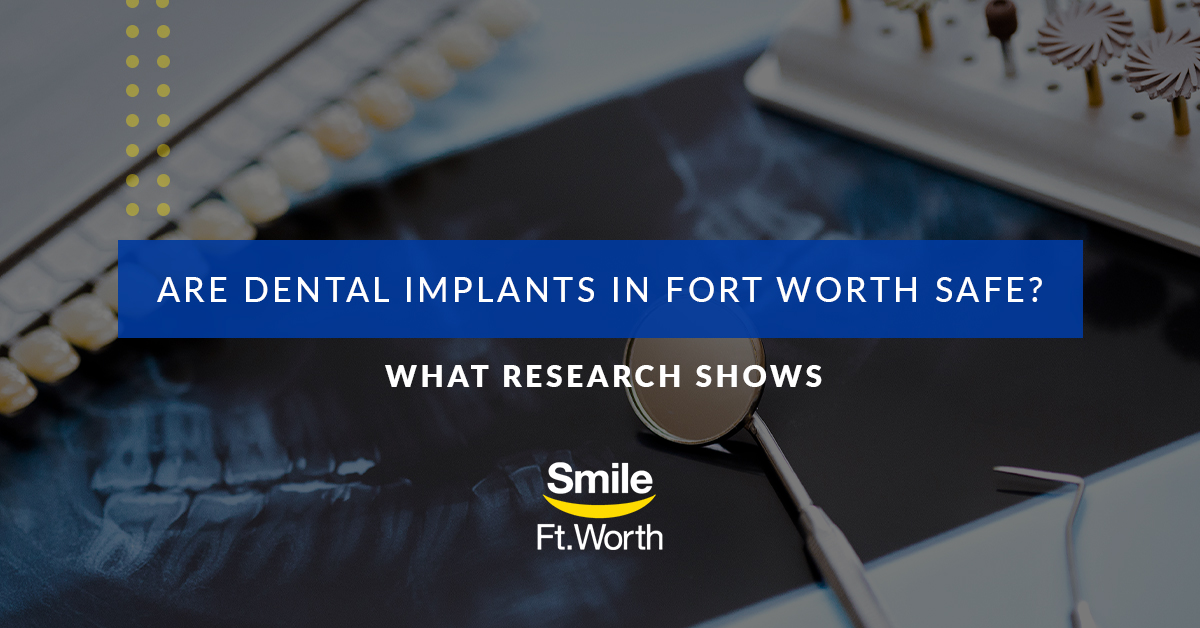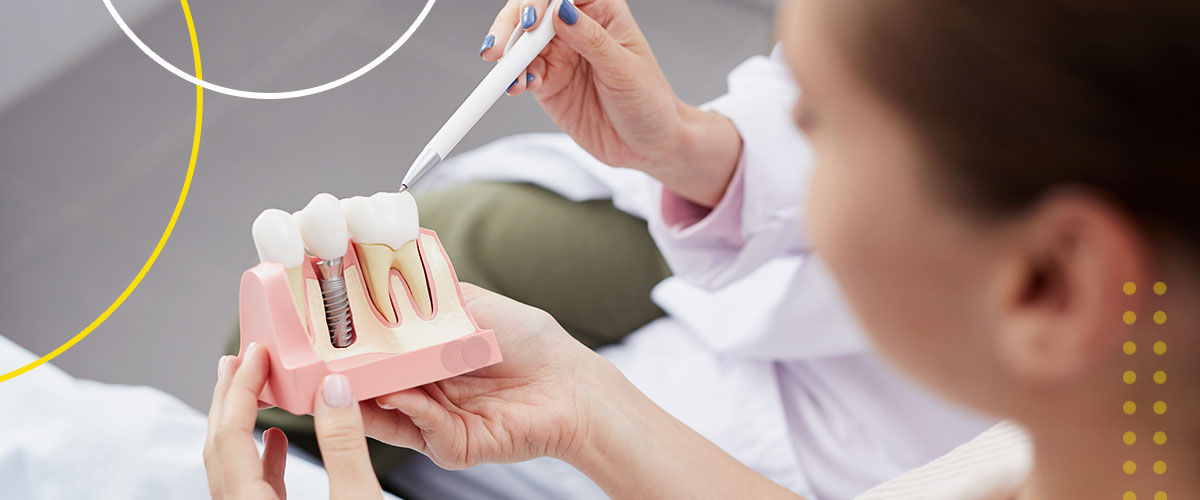While science has yet to uncover ways to make lost teeth grow back, there are various ways to tackle the emotional, aesthetic, and functional impairment that comes with tooth loss as an adult. One of the most common treatments? Dental implants.
They are so common, in fact, that they have become the gold standard for dental professionals far and wide, including right here in Fort Worth.
But despite being a widely accepted course of treatment for a lost tooth or teeth, some patients may be concerned about the safety of this procedure. In this article, we’ll discuss the different types of dental implants in Fort Worth, any potential side effects, and what the research tells us about their safety and efficacy.

Common Types of Dental Implants
Not all dental implants are the same, and the option you and your dentist choose will depend on several factors, including:
- Your overall health
- The number of lost teeth
- The condition of your remaining teeth
- Your candidacy for tooth extraction
- And more
Some patients may not be a good candidate for dental implants. These often include:
- Smokers
- People with gum disease
- People who drink alcohol habitually
- Patients with diabetes that is not well-controlled
- Patients with cancer or who are undergoing cancer treatment
- People with an active infection, especially an infection of the sinuses or mouth
- People with existing nerve damage in their gums, mouth, or face
- People who suffer from severe bone loss
Endosteal Implant
With Endosteal Implants, a titanium screw fills the role of an artificial root. A Fort Worth dentist places the implant directly into your jawbone through a minimally invasive surgical procedure. Once the new root has been placed, patients will need to wait some length of time — often around two months — for the bone and tissue to heal before the procedure can be completed.
These implants are ideal for patients with recent tooth loss who haven’t lost significant bone density in their jawbone. In general, endosteal implants are known for feeling very natural and being highly stable — in fact, most titanium implants will last a patient for life. They are the most common type of dental implant in use today.
Subperiosteal Implants
Subperiosteal Implants may be an option for patients who were not eligible to receive endosteal implants due to insufficient jawbone density. Even so, subperiosteal implants are less common today. They tend to be less stable than endosteal implants since they are placed within the gum tissue rather than drilled into the jawbone. Still, they can provide a worthwhile alternative to traditional dentures.

Side Effects of Dental Implants in Fort Worth
Like most medical or surgical procedure, dental implants can come with some potential side effects. Typically, the risks are minimal, and many patients report feeling that they are more than worth it in the end.
Some of these side effects can include:
- Nausea due to anesthesia
- Swelling, pain, or bleeding at the surgical site
- The bone not properly accepting the implant
- Nerve damage
- Infection

What the Research Says
Some concerns tend to pop up among patients who are considering whether dental implants are right for them. It’s always a good idea to turn to the research for answers, and that’s precisely where a Fort Worth dental implant dentist will point prospective patients.
Can dental implants cause oral cancer?
Among one of the most common concerns is whether dental implants can lead to oral cancer. It’s natural to wonder and be concerned. Many patients wonder if titanium restorations are safe for their oral health long-term.
While regular oral cancer screenings are always a good idea, there’s good news for concerned would-be patients. A study in the Journal of Oral and Maxillofacial Research concluded that there is no direct link between dental implants and oral cancer.
According to the study’s conclusions, “It was observed that there were no significant differences in number of incidences of oral cancer between patients with history of malignancy and those without.”
Can dental implants cause a toxic or allergic reaction?
The good news is that titanium tends to cause fewer allergic reactions than other metals. However, it is possible for humans to be allergic to titanium. Fortunately, it is very rare. There is a test that concerned patients can take called Memory Lymphocyte Immunostimulation Assay (or MELISA® for short.) This test is used to detect type IV hypersensitivities to metals, environmental toxins, chemicals, and even molds.
If you suspect that you might be allergic to titanium, it would be wise to consider taking this test prior to moving forward with titanium dental implants.
If the test does confirm that you are allergic to titanium, alternative materials may be used for your dental implants, such as zirconia.

Dental Implants May Be Safer Than Going Without
Research and years of treatment experience shows that dental implants are a tried and true, safe solution to missing teeth.
In fact, more than simply being safe, it is actually more dangerous for patients to go without dental implants. The reason is that there are a number of potential hazards that come with missing teeth. These can include:
Jawbone Deterioration
When teeth are missing from the jawbone, the bone may begin to deteriorate in their absence. The flow of nutrients could even be restricted due to shriveled capillaries. This can lead to jaw bone loss and shifting, weakened teeth.
Abnormal Pressure
When teeth are missing, it’s no surprise that the distribution of pressure on your remaining teeth changes whenever you bite, eat, or chew. This distribution of pressure can have serious implications for the rest of your teeth, making them more likely to be weakened or suffer a break.
The Final Word: Dental Implants are a Safe and Effective Treatment for Tooth Loss
Dental implants are a safe and effective way to keep your smile healthy even after you’ve suffered a loss or removal of one or more teeth. They are durable — so durable, in fact — that they may never need to be replaced provided patients use proper oral hygiene and dental care.
It’s natural to have concerns. That’s why you should turn to a trusted Fort Worth dentist to ask questions and find out if you are a good candidate for dental implants in Fort Worth.
Are you curious to learn more about dental implants? Do you think they might be a good solution for restoring your own smile? Learn more about what to expect before, during, and after dental implant treatment in this recent article.
Contact Smile Fort Worth
Plan Your Next Visit to Our Office.









Recent Comments